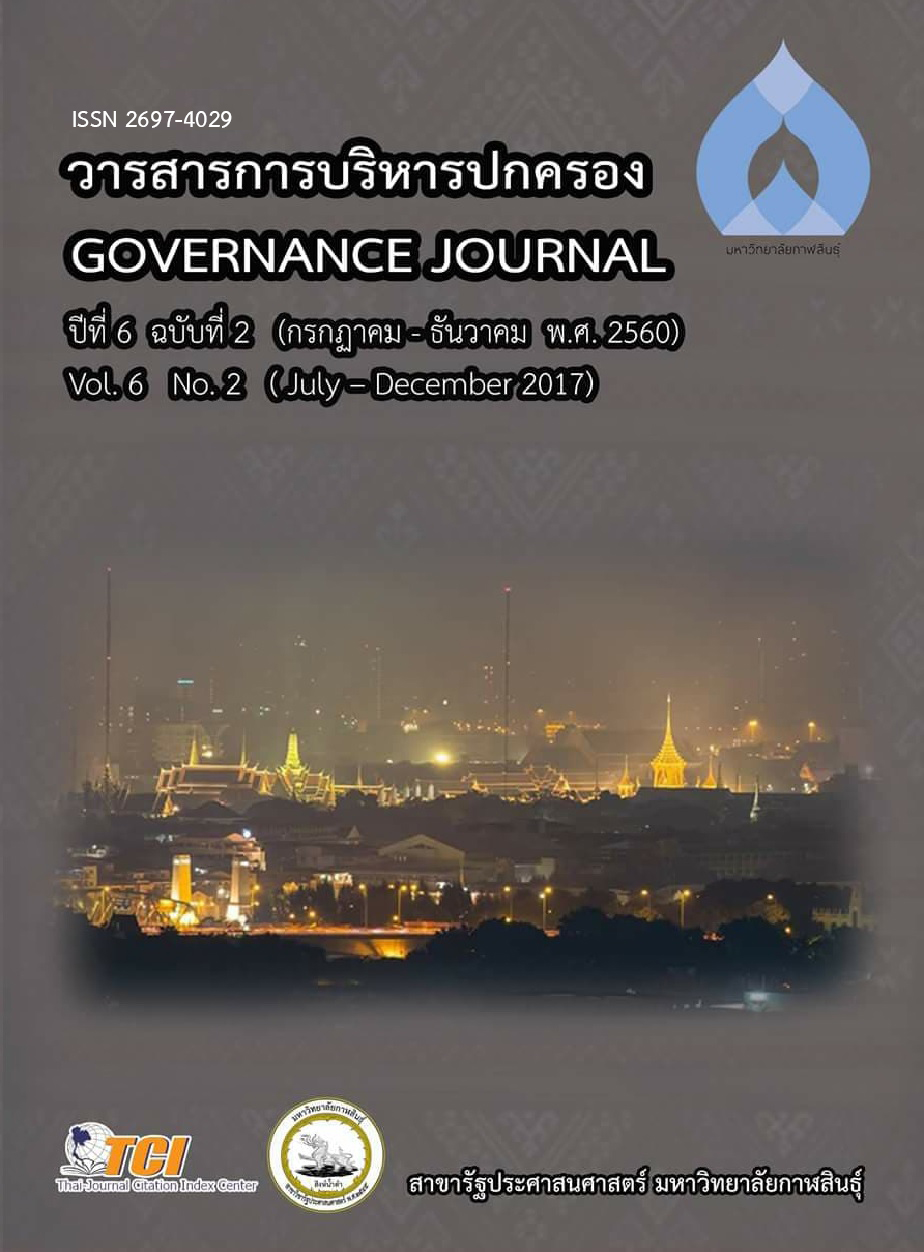กลยุทธ์การบริหารโรงเรียนทางเลือกตามแนวคิดการเสริมสร้างขีดความสามารถของพลเมืองปัจเจกชนนิยม
DOI:
https://doi.org/10.14456/gjl.2017.40คำสำคัญ:
โรงเรียนทางเลือก; พลเมืองปัจเจกชนนิยม; ขีดความสามารถบทคัดย่อ
การวิจัยนี้มีวัตถุประสงค์เพื่อศึกษาสภาพปัจจุบันที่พึงประสงค์ และพัฒนากลยุทธ์การบริหารโรงเรียนทางเลือกตามแนวคิดการเสริมสร้างขีดความสามารถของพลเมืองปัจเจกชนนิยม โดยใช้วิธีวิจัยแบบผสม โดยมีผู้ทรงคุณวุฒิ ประเมินกรอบแนวคิดจำนวน 5 คน ประเมินเครื่องมือการวิจัย จำนวน 9 คน ประเมินร่างกลยุทธ์จำนวน 20 คน และประชุมกลุ่มจำนวน 8 คน ประชากรที่ศึกษา คือ โรงเรียนทางเลือกจำนวน 28 โรงเรียน กลุ่มตัวอย่างและผู้ให้ข้อมูล คือ ครู 287 คน และผู้บริหาร 37 คน เครื่องมือที่ใช้ในการวิจัย คือ แบบประเมินร่างกลยุทธ์ และแบบสอบถาม วิเคราะห์ข้อมูลด้วยสถิติเชิงบรรยาย ได้แก่ ความถี่ ร้อยละ ค่าเฉลี่ย ส่วนเบี่ยงเบนมาตรฐาน และเทคนิค PNImodified ผลการวิจัยพบว่า 1) สภาพปัจจุบันมีค่าเฉลี่ยอยู่ในระดับมาก ส่วนสภาพที่พึงประสงค์อยู่ในระดับมากที่สุด โดยภาพรวมการจัดกิจกรรมเสริมหลักสูตรเป็นจุดอ่อน การจัดการเรียนการสอนรายวิชาเป็นจุดแข็ง ส่วนภาวะคุกคาม คือ การเมืองและนโยบายของรัฐ และโอกาส คือ สภาพเศรษฐกิจ สังคม และเทคโนโลยี 2) กลยุทธ์การบริหารโรงเรียนทางเลือกมี 2 กลยุทธ์หลัก คือ (1) พัฒนาการบริหารวิชาการด้วยการจัดการเรียนการสอนรายวิชาเพื่อเสริมสร้างขีดความสามารถของพลเมืองปัจเจกชนนิยม (2) พัฒนาการบริหารด้านกิจการนักเรียนด้วยการจัดกิจกรรมเสริมหลักสูตรเพื่อเสริมสร้างขีดความสามารถของพลเมืองปัจเจกชนนิยม
Downloads
เอกสารอ้างอิง
นริศรา จริยะพันธุ์. (2554). การจัดการเรียนการสอนของโรงเรียนทางเลือกและ
พระราชบัญญัติ การศึกษาแห่งชาติ พ.ศ.2542. รายงานการประชุม
วิชาการและการนำเสนอผลงานวิจัยและวิทยานิพนธ์ระดับบัณฑิตศึกษา ครั้งที่ 3, สถาบันบัณฑิตพัฒนบริหารศาสตร์.
ปกป้อง จันวิทย์ และสุนทร ตันมันทอง. (2555). โรงเรียนทางเลือกกับทางเลือก
ในการศึกษาของประชาชน. การสัมมนาวิชาการประจำปี 2554: “ยกเครื่องการศึกษาไทย: สู่การศึกษาที่มีคุณภาพอย่างทั่วถึง”.
ปกป้อง จันวิทย์ และศศิ วุฒิวัฒน์. (2556). การพัฒนาทุนมนุษย์เพื่อผลิตภาพ,
การสัมมนาวิชาการ.“โมเดลใหม่ในการพัฒนา: สู่การเติบโตอย่างมีคุณภาพโดยการเพิ่มผลิตภาพ”.
ประนอม เดชชัย. (2536). เสริมทักษะการเรียนการสอนวิชาสังคมศึกษา.
กรุงเทพฯ: ภาควิชามัธยมศึกษา มหาวิทยาลัยเชียงใหม่
พนายุทธ เชยบาล. (2550). การนำเสนอแบบจำลองการบริหารจัดการโรงเรียน
ทางเลือกในประเทศไทย. วิทยานิพน์ดุษฎีบัณฑิต. สาขาการบริหารและพัฒนาการศึกษา, บัณฑิตวิทยาลัย. มหาวิทยาลัยมหาสารคาม.
เมธี ศรีวะรมย์, สุวพร เซ็มเฮง และ ธนวรรธ ศรีวะรมย์. (2560). รูปแบบการ
บริหารจัดการแหล่งเรียนรู้สำหรับสถานศึกษาของวิทยาลัยเทคโนโลยีและอาชีวศึกษาเอกชน จังหวัดยโสธร, วารสารการบริหารปกครอง, 6 (1) : 346 – 378.
รัชนี ธงไชย. (2553). การศึกษาทางเลือกในสังคมไทย ข้อเสนอเชิงยุทธศาสตร์
เพื่อการขับเคลื่อน. กรุงเทพฯ : สำนักงานกองทุนสนับสนุนการสร้างเสริมสุขภาพ.
สุชาดา จักรพิสุทธิ์ และคณะ. (2548). การศึกษาทางเลือก : โลกแห่งการเรียนรู้
นอกโรงเรียน. กรุงเทพฯ: สำนักงานกองทุนสนับสนุนการวิจัย (สกว.).
สำนักวิชาการและมาตรฐานการศึกษา. (2553). แนวทางการนำจุดเน้นการพัฒนา
ผู้เรียนสู่การปฏิบัติ. กรุงเทพฯ : สำนักงานคณะกรรมการการศึกษา
ขั้นพื้นฐาน.
สำนักงานส่งเสริมการศึกษานอกระบบและการศึกษาตามอัธยาศรัย. (2551).
คัมภีร์ กศน. กรุงเทพฯ : สำนักงานส่งเสริมการศึกษานอกระบบและ
การศึกษาตามอัธยาศรัย
Australian Curriculum Assessment and Reporting Authority. (2013).
General Capabilities. Consultation Report. June to August.
Hase,Stewart. (2000). Capability and Coping in the New Millennium:
a New Challenge for Education. Southern Cross University:ePublications@SCU.
Mzinyati, A. & Xinwa M. (n.d.). Collectivism Versus Individualism.
(Presentation Paper).
Oyserman, D., Coon, H.M., & Kemmelmeier, M. (2002). Rethinking
Individualism and collectivism: Evaluation of theoretical Assumptions and meta-analyses.Psychological Bulletin, Vol.128 (1),3-72.
Stephenson, J. (1992). Quality in Learning; Capacity and Quality in
Higher Education. London:Kogan Page.
Translated Thai References
Bureau of Academic and Educational Standards. (2010). The
Guidelines Focus on Improving the Learning into Practice. Bangkok : Office of the Basic Education Commission
Bureau of Non-Formal and Informal Education Talks Al drugs. (2008).
Bible KORSORNOR. Bangkok : Bureau of Non-Formal and
Informal Education Talks Al drugs.
Cheyban, P. (2007). Presentation of Model Management
Alternative Schools in Thailand. Administration and Development Studies, Thesis. Graduate School. Mahasarakham University.
Dechchai, P. (1993). Skills taught social studies. Bangkok:
Department of secondary education at Chiang Mai University.
Jakarapisut, S. and other. (2005). Alternative Education: The World
of Learning Outside School. Bangkok : The Thailand Research Fund (TRF).
Jariyapan, N. 2011. Management of teaching and school choice and
Act The National Education Act 2542. Proceeding Presenting the Results of Research and Graduate theses 3rd, NIDA.
Junvith, P. and Sunthon, T. (2012). School Choice and Alternatives
Public Education. The Seminar 2554: "Revamping Thai Education System: Quallity for all”.
Junvith, P. and Sasi, V. (2013). Developing Human Capital to
Productivity, The Seminar. "The New Model of Development: the Growth of Quality Increasing Productivity.”
Thongchai R. 2010. Alternative education in Thailand. Proposals
for strategic propulsion. Department of Health.
Sriwarom, M., Suwaporn, S. and Tanavat, S. (2017). A Model of
Learning Resources Management for Private Technological and Vocational College in Yasothon Province. Governance Journal, 6 (1) : 346 – 378.
ดาวน์โหลด
เผยแพร่แล้ว
รูปแบบการอ้างอิง
ฉบับ
ประเภทบทความ
สัญญาอนุญาต

อนุญาตภายใต้เงื่อนไข Creative Commons Attribution-NonCommercial-NoDerivatives 4.0 International License.








